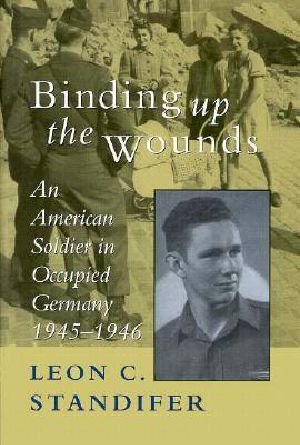Binding Up the Wounds · An American Soldier in Occupied Germany, 1945 · 1946

- Authors
- Standifer, Leon C.
- Publisher
- LSU Press
- Tags
- test
- ISBN
- 9780807120941
- Date
- 1996-01-01T00:00:00+00:00
- Size
- 0.42 MB
- Lang
- en
In his highly acclaimed Not in Vain, Leon C. Standifer recounted his experiences as a small-town Mississippi boy who at age nineteen found himself fighting as a combat infantryman in World War II France and Germany. Binding Up the Wounds carries the story beyond V-E Day to describe what the author saw, heard, felt, and learned as a member of the American occupation army in the homeland of its defeated enemy.
Standifer, who served in the 94th Infantry Division in western Germany, the Sudetenland, and Bavaria in the first year of occupation, chronicles that unique and chaotic time from the viewpoint of a typical GI. Germany was an epic landscape of human need, and cities lay in ruins. But the war was over, light and laughter were once again possible, and, as Standifer recalls, "we had a ball during that first year." Among the things he experienced or witnessed were black-market operations large and small (American cigarettes served as a universal currency, and a few ounces of mess-hall grease or used coffee grounds were valuable commodities); the spectacle of gung-ho officers attempting to turn combat troops into spit-and-polish paraders; the exploitative games played between American soldiers and German women; a gut-wrenching visit to a displaced persons camp; and the difficulties involved in guarding captured soldiers who were no longer the enemy.
Perhaps most revealing, and often surprising, are the attitudes Standifer discovered among ordinary Germans toward the war, the Nazis, the "Hitler times" in general--not only during the occupation, but also decades later when he revisited Germany and spoke with elderly survivors of those times. For there are really two voices telling the tale of Binding Up the Wounds. One is that of the combat-hardened but otherwise naive twenty-year-old who lived the experiences. The other is that of the author as retired college professor looking back over half a century and puzzling out what those experiences meant for himself, for America, and for human-kind.